Academic Integrity in Higher Education: Game Design and Reflection
VerifiedAdded on 2023/06/18
|9
|2549
|153
Report
AI Summary
This report provides an overview of academic integrity in higher education, emphasizing its importance, defining academic misconduct, and exploring its implications. It discusses the significance of honesty, fairness, and responsibility in academic work, highlighting the consequences of plagiarism, cheating, and data falsification. The report also reflects on the process of designing a game to promote academic integrity, detailing the steps taken, difficulties encountered, and skills developed, such as creativity, technical expertise, communication, and organization. The game aims to encourage students to produce original content and adhere to academic rules, ultimately enhancing their skills and future career prospects. The report concludes that upholding academic integrity is crucial for the reputation of educational institutions and the success of students.
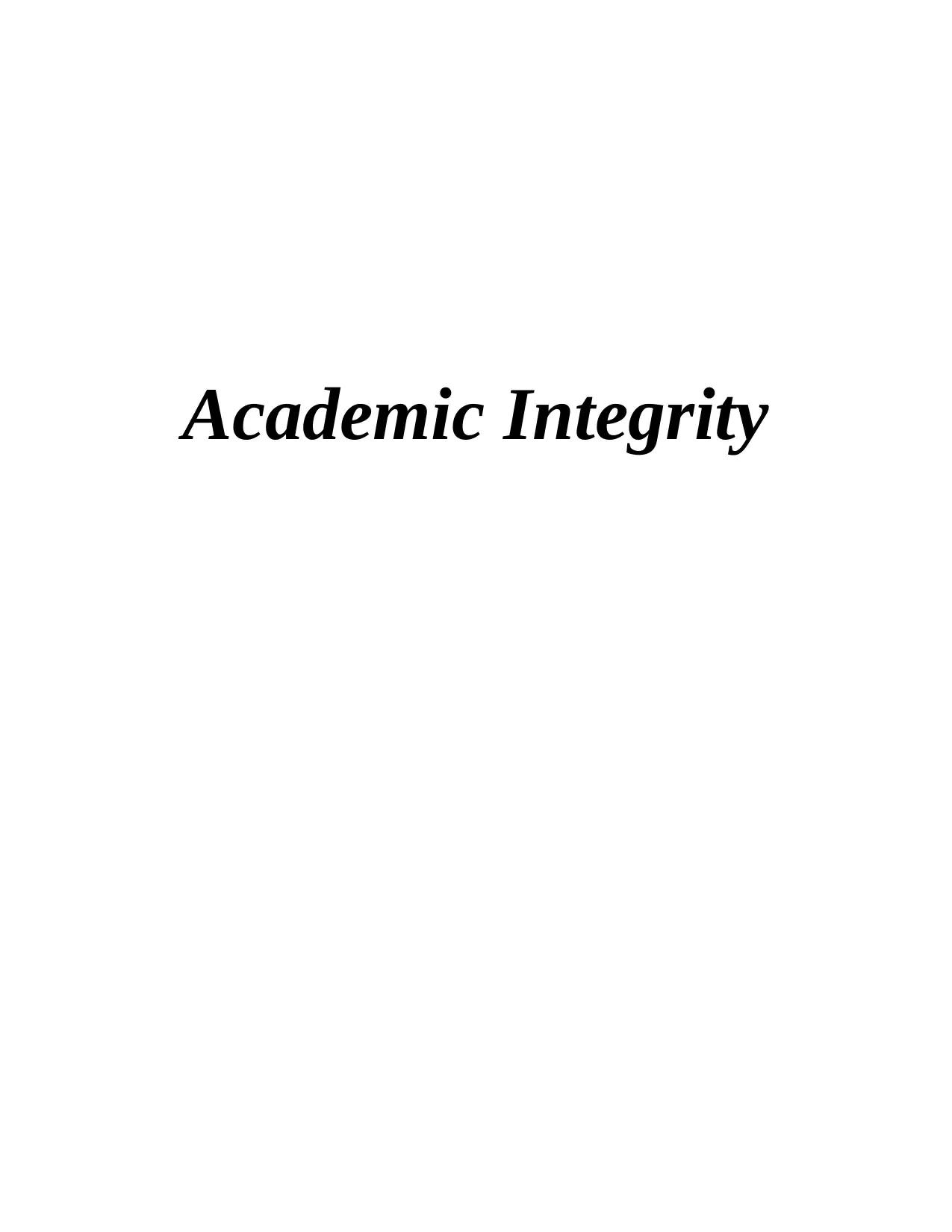
Academic Integrity
Paraphrase This Document
Need a fresh take? Get an instant paraphrase of this document with our AI Paraphraser
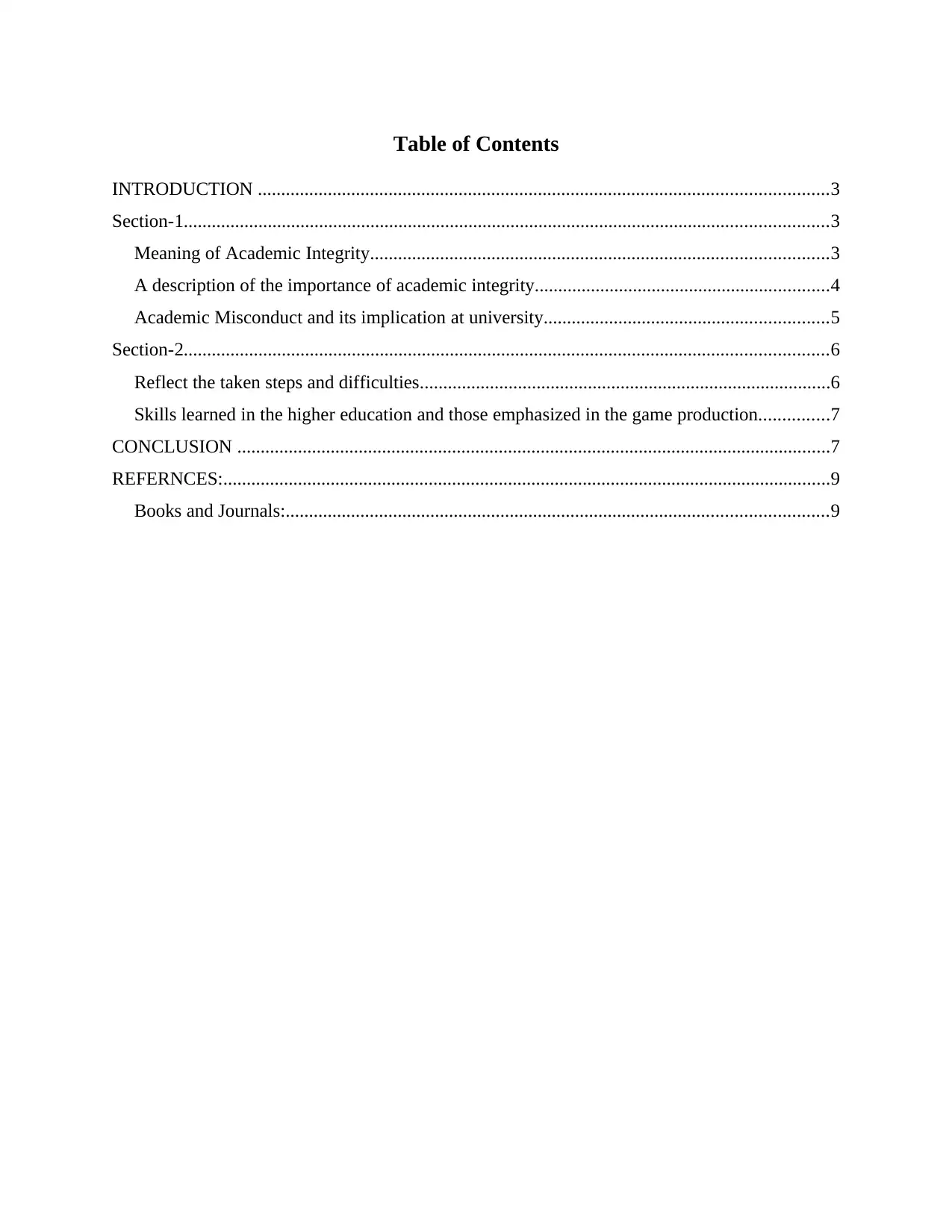
Table of Contents
INTRODUCTION ..........................................................................................................................3
Section-1..........................................................................................................................................3
Meaning of Academic Integrity..................................................................................................3
A description of the importance of academic integrity...............................................................4
Academic Misconduct and its implication at university.............................................................5
Section-2..........................................................................................................................................6
Reflect the taken steps and difficulties........................................................................................6
Skills learned in the higher education and those emphasized in the game production...............7
CONCLUSION ...............................................................................................................................7
REFERNCES:..................................................................................................................................9
Books and Journals:....................................................................................................................9
INTRODUCTION ..........................................................................................................................3
Section-1..........................................................................................................................................3
Meaning of Academic Integrity..................................................................................................3
A description of the importance of academic integrity...............................................................4
Academic Misconduct and its implication at university.............................................................5
Section-2..........................................................................................................................................6
Reflect the taken steps and difficulties........................................................................................6
Skills learned in the higher education and those emphasized in the game production...............7
CONCLUSION ...............................................................................................................................7
REFERNCES:..................................................................................................................................9
Books and Journals:....................................................................................................................9
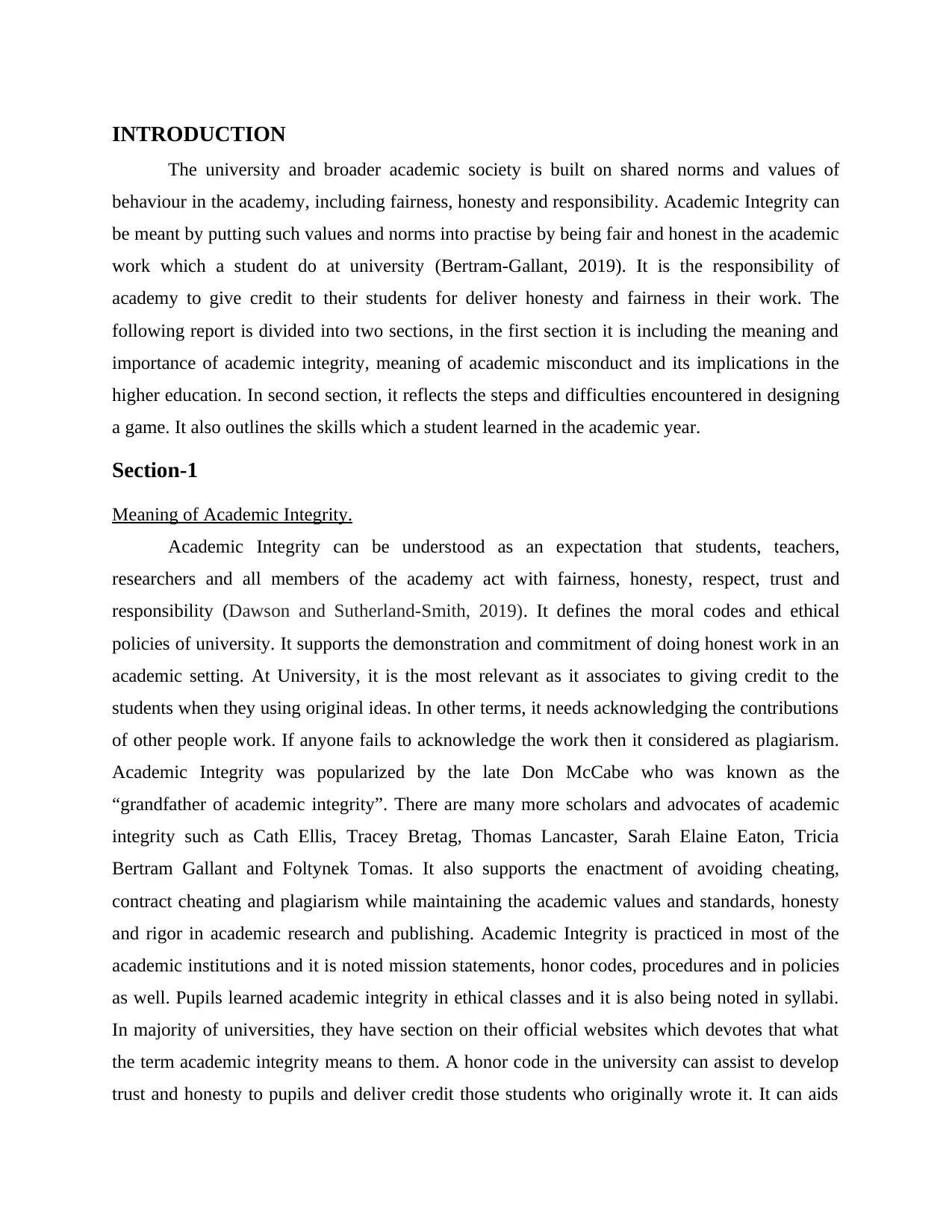
INTRODUCTION
The university and broader academic society is built on shared norms and values of
behaviour in the academy, including fairness, honesty and responsibility. Academic Integrity can
be meant by putting such values and norms into practise by being fair and honest in the academic
work which a student do at university (Bertram-Gallant, 2019). It is the responsibility of
academy to give credit to their students for deliver honesty and fairness in their work. The
following report is divided into two sections, in the first section it is including the meaning and
importance of academic integrity, meaning of academic misconduct and its implications in the
higher education. In second section, it reflects the steps and difficulties encountered in designing
a game. It also outlines the skills which a student learned in the academic year.
Section-1
Meaning of Academic Integrity.
Academic Integrity can be understood as an expectation that students, teachers,
researchers and all members of the academy act with fairness, honesty, respect, trust and
responsibility (Dawson and Sutherland-Smith, 2019). It defines the moral codes and ethical
policies of university. It supports the demonstration and commitment of doing honest work in an
academic setting. At University, it is the most relevant as it associates to giving credit to the
students when they using original ideas. In other terms, it needs acknowledging the contributions
of other people work. If anyone fails to acknowledge the work then it considered as plagiarism.
Academic Integrity was popularized by the late Don McCabe who was known as the
“grandfather of academic integrity”. There are many more scholars and advocates of academic
integrity such as Cath Ellis, Tracey Bretag, Thomas Lancaster, Sarah Elaine Eaton, Tricia
Bertram Gallant and Foltynek Tomas. It also supports the enactment of avoiding cheating,
contract cheating and plagiarism while maintaining the academic values and standards, honesty
and rigor in academic research and publishing. Academic Integrity is practiced in most of the
academic institutions and it is noted mission statements, honor codes, procedures and in policies
as well. Pupils learned academic integrity in ethical classes and it is also being noted in syllabi.
In majority of universities, they have section on their official websites which devotes that what
the term academic integrity means to them. A honor code in the university can assist to develop
trust and honesty to pupils and deliver credit those students who originally wrote it. It can aids
The university and broader academic society is built on shared norms and values of
behaviour in the academy, including fairness, honesty and responsibility. Academic Integrity can
be meant by putting such values and norms into practise by being fair and honest in the academic
work which a student do at university (Bertram-Gallant, 2019). It is the responsibility of
academy to give credit to their students for deliver honesty and fairness in their work. The
following report is divided into two sections, in the first section it is including the meaning and
importance of academic integrity, meaning of academic misconduct and its implications in the
higher education. In second section, it reflects the steps and difficulties encountered in designing
a game. It also outlines the skills which a student learned in the academic year.
Section-1
Meaning of Academic Integrity.
Academic Integrity can be understood as an expectation that students, teachers,
researchers and all members of the academy act with fairness, honesty, respect, trust and
responsibility (Dawson and Sutherland-Smith, 2019). It defines the moral codes and ethical
policies of university. It supports the demonstration and commitment of doing honest work in an
academic setting. At University, it is the most relevant as it associates to giving credit to the
students when they using original ideas. In other terms, it needs acknowledging the contributions
of other people work. If anyone fails to acknowledge the work then it considered as plagiarism.
Academic Integrity was popularized by the late Don McCabe who was known as the
“grandfather of academic integrity”. There are many more scholars and advocates of academic
integrity such as Cath Ellis, Tracey Bretag, Thomas Lancaster, Sarah Elaine Eaton, Tricia
Bertram Gallant and Foltynek Tomas. It also supports the enactment of avoiding cheating,
contract cheating and plagiarism while maintaining the academic values and standards, honesty
and rigor in academic research and publishing. Academic Integrity is practiced in most of the
academic institutions and it is noted mission statements, honor codes, procedures and in policies
as well. Pupils learned academic integrity in ethical classes and it is also being noted in syllabi.
In majority of universities, they have section on their official websites which devotes that what
the term academic integrity means to them. A honor code in the university can assist to develop
trust and honesty to pupils and deliver credit those students who originally wrote it. It can aids
⊘ This is a preview!⊘
Do you want full access?
Subscribe today to unlock all pages.

Trusted by 1+ million students worldwide
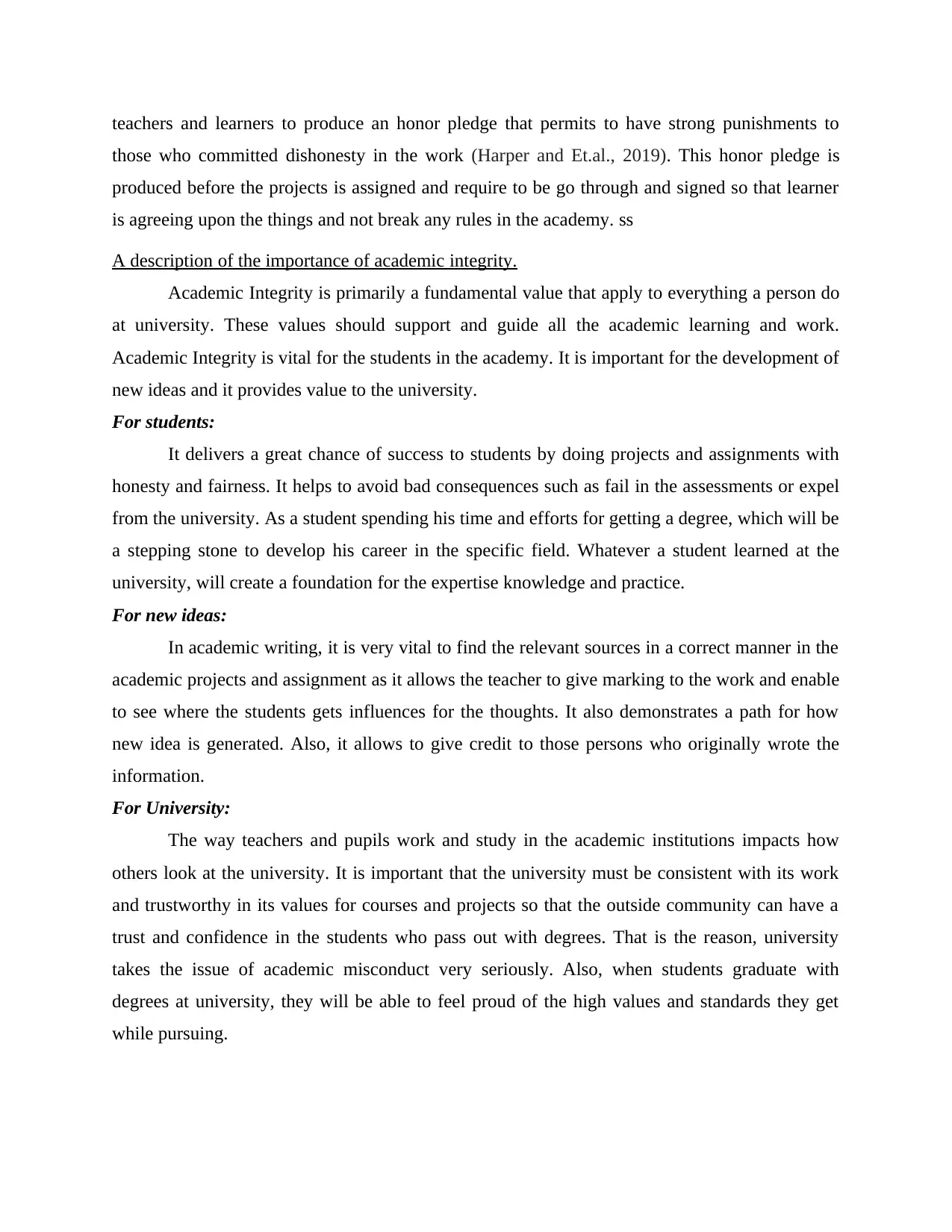
teachers and learners to produce an honor pledge that permits to have strong punishments to
those who committed dishonesty in the work (Harper and Et.al., 2019). This honor pledge is
produced before the projects is assigned and require to be go through and signed so that learner
is agreeing upon the things and not break any rules in the academy. ss
A description of the importance of academic integrity.
Academic Integrity is primarily a fundamental value that apply to everything a person do
at university. These values should support and guide all the academic learning and work.
Academic Integrity is vital for the students in the academy. It is important for the development of
new ideas and it provides value to the university.
For students:
It delivers a great chance of success to students by doing projects and assignments with
honesty and fairness. It helps to avoid bad consequences such as fail in the assessments or expel
from the university. As a student spending his time and efforts for getting a degree, which will be
a stepping stone to develop his career in the specific field. Whatever a student learned at the
university, will create a foundation for the expertise knowledge and practice.
For new ideas:
In academic writing, it is very vital to find the relevant sources in a correct manner in the
academic projects and assignment as it allows the teacher to give marking to the work and enable
to see where the students gets influences for the thoughts. It also demonstrates a path for how
new idea is generated. Also, it allows to give credit to those persons who originally wrote the
information.
For University:
The way teachers and pupils work and study in the academic institutions impacts how
others look at the university. It is important that the university must be consistent with its work
and trustworthy in its values for courses and projects so that the outside community can have a
trust and confidence in the students who pass out with degrees. That is the reason, university
takes the issue of academic misconduct very seriously. Also, when students graduate with
degrees at university, they will be able to feel proud of the high values and standards they get
while pursuing.
those who committed dishonesty in the work (Harper and Et.al., 2019). This honor pledge is
produced before the projects is assigned and require to be go through and signed so that learner
is agreeing upon the things and not break any rules in the academy. ss
A description of the importance of academic integrity.
Academic Integrity is primarily a fundamental value that apply to everything a person do
at university. These values should support and guide all the academic learning and work.
Academic Integrity is vital for the students in the academy. It is important for the development of
new ideas and it provides value to the university.
For students:
It delivers a great chance of success to students by doing projects and assignments with
honesty and fairness. It helps to avoid bad consequences such as fail in the assessments or expel
from the university. As a student spending his time and efforts for getting a degree, which will be
a stepping stone to develop his career in the specific field. Whatever a student learned at the
university, will create a foundation for the expertise knowledge and practice.
For new ideas:
In academic writing, it is very vital to find the relevant sources in a correct manner in the
academic projects and assignment as it allows the teacher to give marking to the work and enable
to see where the students gets influences for the thoughts. It also demonstrates a path for how
new idea is generated. Also, it allows to give credit to those persons who originally wrote the
information.
For University:
The way teachers and pupils work and study in the academic institutions impacts how
others look at the university. It is important that the university must be consistent with its work
and trustworthy in its values for courses and projects so that the outside community can have a
trust and confidence in the students who pass out with degrees. That is the reason, university
takes the issue of academic misconduct very seriously. Also, when students graduate with
degrees at university, they will be able to feel proud of the high values and standards they get
while pursuing.
Paraphrase This Document
Need a fresh take? Get an instant paraphrase of this document with our AI Paraphraser
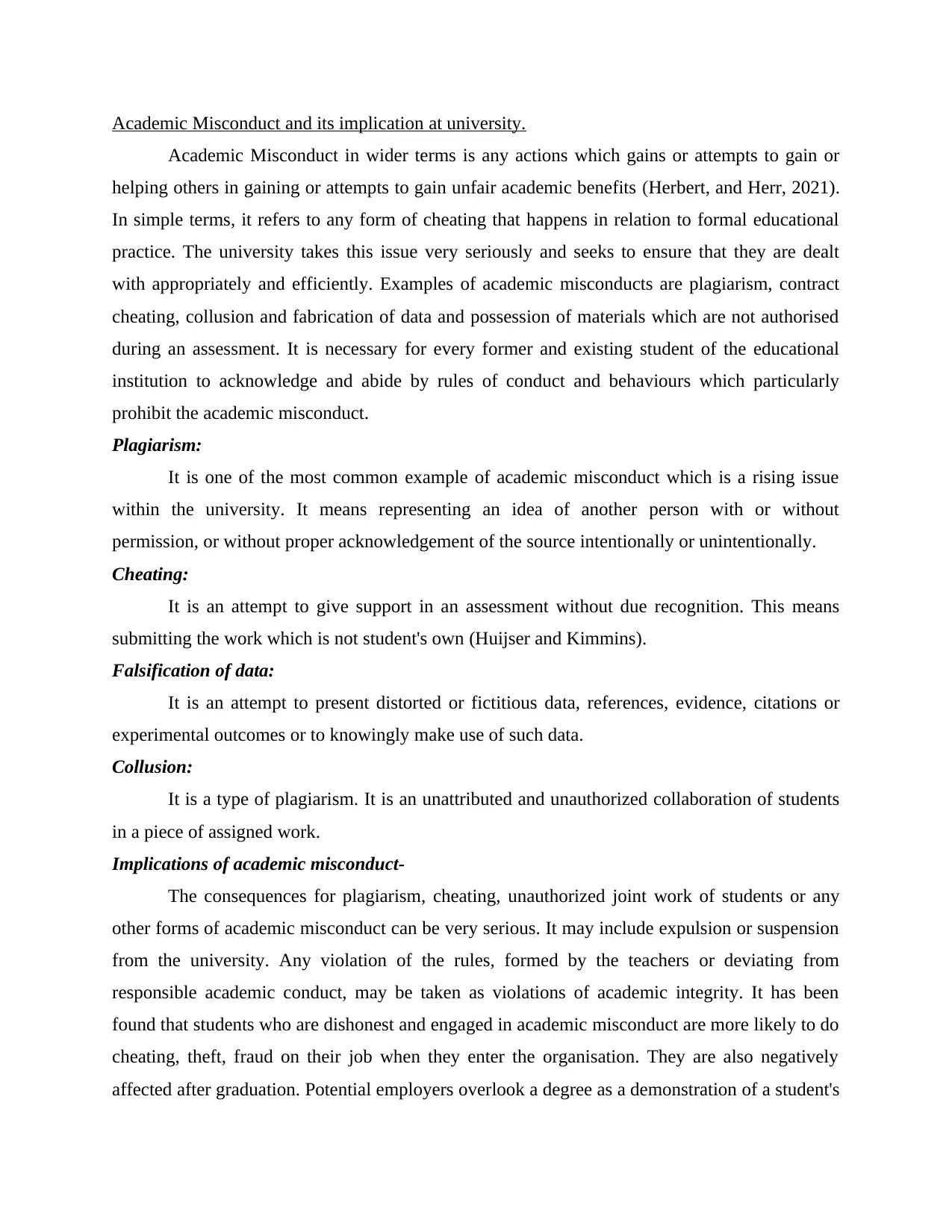
Academic Misconduct and its implication at university.
Academic Misconduct in wider terms is any actions which gains or attempts to gain or
helping others in gaining or attempts to gain unfair academic benefits (Herbert, and Herr, 2021).
In simple terms, it refers to any form of cheating that happens in relation to formal educational
practice. The university takes this issue very seriously and seeks to ensure that they are dealt
with appropriately and efficiently. Examples of academic misconducts are plagiarism, contract
cheating, collusion and fabrication of data and possession of materials which are not authorised
during an assessment. It is necessary for every former and existing student of the educational
institution to acknowledge and abide by rules of conduct and behaviours which particularly
prohibit the academic misconduct.
Plagiarism:
It is one of the most common example of academic misconduct which is a rising issue
within the university. It means representing an idea of another person with or without
permission, or without proper acknowledgement of the source intentionally or unintentionally.
Cheating:
It is an attempt to give support in an assessment without due recognition. This means
submitting the work which is not student's own (Huijser and Kimmins).
Falsification of data:
It is an attempt to present distorted or fictitious data, references, evidence, citations or
experimental outcomes or to knowingly make use of such data.
Collusion:
It is a type of plagiarism. It is an unattributed and unauthorized collaboration of students
in a piece of assigned work.
Implications of academic misconduct-
The consequences for plagiarism, cheating, unauthorized joint work of students or any
other forms of academic misconduct can be very serious. It may include expulsion or suspension
from the university. Any violation of the rules, formed by the teachers or deviating from
responsible academic conduct, may be taken as violations of academic integrity. It has been
found that students who are dishonest and engaged in academic misconduct are more likely to do
cheating, theft, fraud on their job when they enter the organisation. They are also negatively
affected after graduation. Potential employers overlook a degree as a demonstration of a student's
Academic Misconduct in wider terms is any actions which gains or attempts to gain or
helping others in gaining or attempts to gain unfair academic benefits (Herbert, and Herr, 2021).
In simple terms, it refers to any form of cheating that happens in relation to formal educational
practice. The university takes this issue very seriously and seeks to ensure that they are dealt
with appropriately and efficiently. Examples of academic misconducts are plagiarism, contract
cheating, collusion and fabrication of data and possession of materials which are not authorised
during an assessment. It is necessary for every former and existing student of the educational
institution to acknowledge and abide by rules of conduct and behaviours which particularly
prohibit the academic misconduct.
Plagiarism:
It is one of the most common example of academic misconduct which is a rising issue
within the university. It means representing an idea of another person with or without
permission, or without proper acknowledgement of the source intentionally or unintentionally.
Cheating:
It is an attempt to give support in an assessment without due recognition. This means
submitting the work which is not student's own (Huijser and Kimmins).
Falsification of data:
It is an attempt to present distorted or fictitious data, references, evidence, citations or
experimental outcomes or to knowingly make use of such data.
Collusion:
It is a type of plagiarism. It is an unattributed and unauthorized collaboration of students
in a piece of assigned work.
Implications of academic misconduct-
The consequences for plagiarism, cheating, unauthorized joint work of students or any
other forms of academic misconduct can be very serious. It may include expulsion or suspension
from the university. Any violation of the rules, formed by the teachers or deviating from
responsible academic conduct, may be taken as violations of academic integrity. It has been
found that students who are dishonest and engaged in academic misconduct are more likely to do
cheating, theft, fraud on their job when they enter the organisation. They are also negatively
affected after graduation. Potential employers overlook a degree as a demonstration of a student's
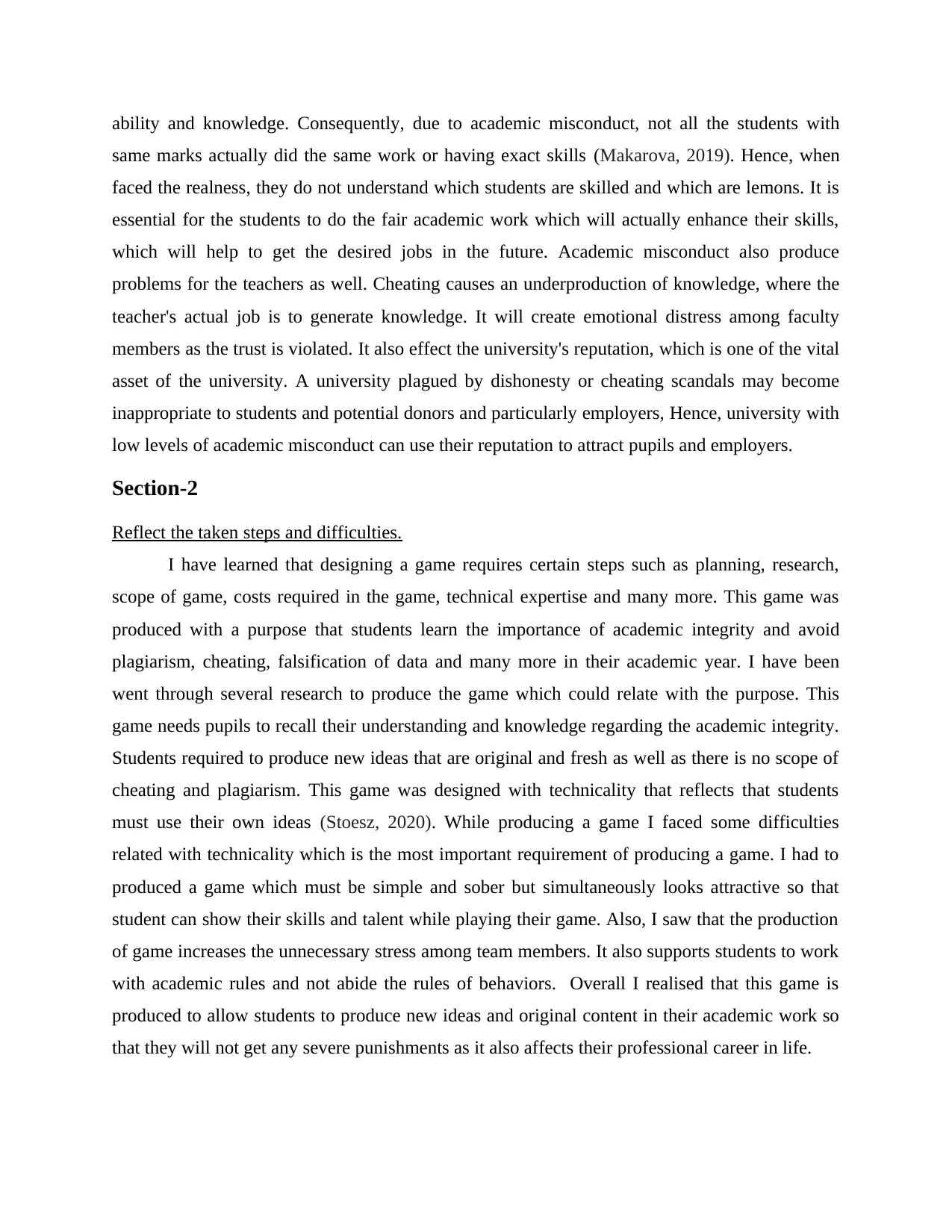
ability and knowledge. Consequently, due to academic misconduct, not all the students with
same marks actually did the same work or having exact skills (Makarova, 2019). Hence, when
faced the realness, they do not understand which students are skilled and which are lemons. It is
essential for the students to do the fair academic work which will actually enhance their skills,
which will help to get the desired jobs in the future. Academic misconduct also produce
problems for the teachers as well. Cheating causes an underproduction of knowledge, where the
teacher's actual job is to generate knowledge. It will create emotional distress among faculty
members as the trust is violated. It also effect the university's reputation, which is one of the vital
asset of the university. A university plagued by dishonesty or cheating scandals may become
inappropriate to students and potential donors and particularly employers, Hence, university with
low levels of academic misconduct can use their reputation to attract pupils and employers.
Section-2
Reflect the taken steps and difficulties.
I have learned that designing a game requires certain steps such as planning, research,
scope of game, costs required in the game, technical expertise and many more. This game was
produced with a purpose that students learn the importance of academic integrity and avoid
plagiarism, cheating, falsification of data and many more in their academic year. I have been
went through several research to produce the game which could relate with the purpose. This
game needs pupils to recall their understanding and knowledge regarding the academic integrity.
Students required to produce new ideas that are original and fresh as well as there is no scope of
cheating and plagiarism. This game was designed with technicality that reflects that students
must use their own ideas (Stoesz, 2020). While producing a game I faced some difficulties
related with technicality which is the most important requirement of producing a game. I had to
produced a game which must be simple and sober but simultaneously looks attractive so that
student can show their skills and talent while playing their game. Also, I saw that the production
of game increases the unnecessary stress among team members. It also supports students to work
with academic rules and not abide the rules of behaviors. Overall I realised that this game is
produced to allow students to produce new ideas and original content in their academic work so
that they will not get any severe punishments as it also affects their professional career in life.
same marks actually did the same work or having exact skills (Makarova, 2019). Hence, when
faced the realness, they do not understand which students are skilled and which are lemons. It is
essential for the students to do the fair academic work which will actually enhance their skills,
which will help to get the desired jobs in the future. Academic misconduct also produce
problems for the teachers as well. Cheating causes an underproduction of knowledge, where the
teacher's actual job is to generate knowledge. It will create emotional distress among faculty
members as the trust is violated. It also effect the university's reputation, which is one of the vital
asset of the university. A university plagued by dishonesty or cheating scandals may become
inappropriate to students and potential donors and particularly employers, Hence, university with
low levels of academic misconduct can use their reputation to attract pupils and employers.
Section-2
Reflect the taken steps and difficulties.
I have learned that designing a game requires certain steps such as planning, research,
scope of game, costs required in the game, technical expertise and many more. This game was
produced with a purpose that students learn the importance of academic integrity and avoid
plagiarism, cheating, falsification of data and many more in their academic year. I have been
went through several research to produce the game which could relate with the purpose. This
game needs pupils to recall their understanding and knowledge regarding the academic integrity.
Students required to produce new ideas that are original and fresh as well as there is no scope of
cheating and plagiarism. This game was designed with technicality that reflects that students
must use their own ideas (Stoesz, 2020). While producing a game I faced some difficulties
related with technicality which is the most important requirement of producing a game. I had to
produced a game which must be simple and sober but simultaneously looks attractive so that
student can show their skills and talent while playing their game. Also, I saw that the production
of game increases the unnecessary stress among team members. It also supports students to work
with academic rules and not abide the rules of behaviors. Overall I realised that this game is
produced to allow students to produce new ideas and original content in their academic work so
that they will not get any severe punishments as it also affects their professional career in life.
⊘ This is a preview!⊘
Do you want full access?
Subscribe today to unlock all pages.

Trusted by 1+ million students worldwide
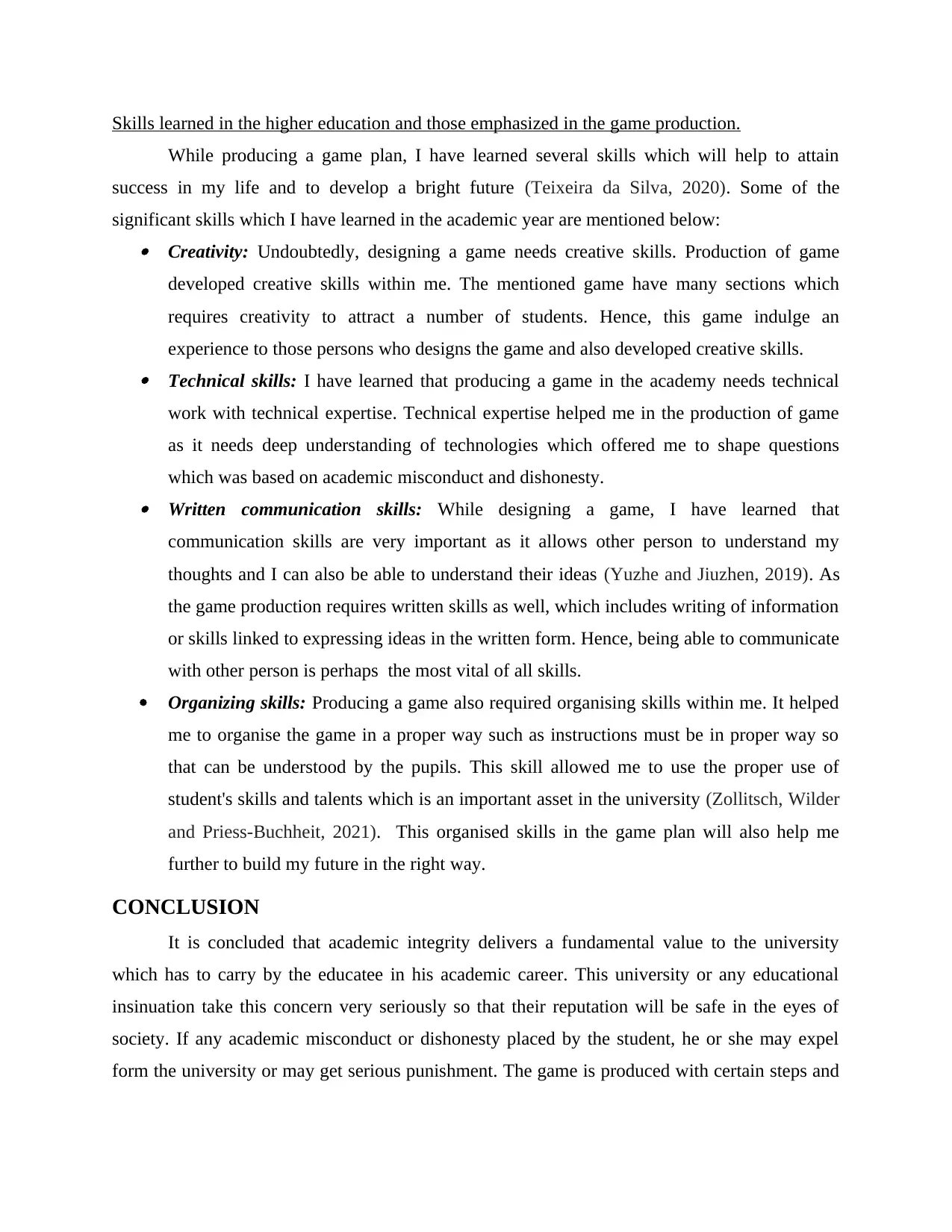
Skills learned in the higher education and those emphasized in the game production.
While producing a game plan, I have learned several skills which will help to attain
success in my life and to develop a bright future (Teixeira da Silva, 2020). Some of the
significant skills which I have learned in the academic year are mentioned below: Creativity: Undoubtedly, designing a game needs creative skills. Production of game
developed creative skills within me. The mentioned game have many sections which
requires creativity to attract a number of students. Hence, this game indulge an
experience to those persons who designs the game and also developed creative skills. Technical skills: I have learned that producing a game in the academy needs technical
work with technical expertise. Technical expertise helped me in the production of game
as it needs deep understanding of technologies which offered me to shape questions
which was based on academic misconduct and dishonesty. Written communication skills: While designing a game, I have learned that
communication skills are very important as it allows other person to understand my
thoughts and I can also be able to understand their ideas (Yuzhe and Jiuzhen, 2019). As
the game production requires written skills as well, which includes writing of information
or skills linked to expressing ideas in the written form. Hence, being able to communicate
with other person is perhaps the most vital of all skills.
Organizing skills: Producing a game also required organising skills within me. It helped
me to organise the game in a proper way such as instructions must be in proper way so
that can be understood by the pupils. This skill allowed me to use the proper use of
student's skills and talents which is an important asset in the university (Zollitsch, Wilder
and Priess-Buchheit, 2021). This organised skills in the game plan will also help me
further to build my future in the right way.
CONCLUSION
It is concluded that academic integrity delivers a fundamental value to the university
which has to carry by the educatee in his academic career. This university or any educational
insinuation take this concern very seriously so that their reputation will be safe in the eyes of
society. If any academic misconduct or dishonesty placed by the student, he or she may expel
form the university or may get serious punishment. The game is produced with certain steps and
While producing a game plan, I have learned several skills which will help to attain
success in my life and to develop a bright future (Teixeira da Silva, 2020). Some of the
significant skills which I have learned in the academic year are mentioned below: Creativity: Undoubtedly, designing a game needs creative skills. Production of game
developed creative skills within me. The mentioned game have many sections which
requires creativity to attract a number of students. Hence, this game indulge an
experience to those persons who designs the game and also developed creative skills. Technical skills: I have learned that producing a game in the academy needs technical
work with technical expertise. Technical expertise helped me in the production of game
as it needs deep understanding of technologies which offered me to shape questions
which was based on academic misconduct and dishonesty. Written communication skills: While designing a game, I have learned that
communication skills are very important as it allows other person to understand my
thoughts and I can also be able to understand their ideas (Yuzhe and Jiuzhen, 2019). As
the game production requires written skills as well, which includes writing of information
or skills linked to expressing ideas in the written form. Hence, being able to communicate
with other person is perhaps the most vital of all skills.
Organizing skills: Producing a game also required organising skills within me. It helped
me to organise the game in a proper way such as instructions must be in proper way so
that can be understood by the pupils. This skill allowed me to use the proper use of
student's skills and talents which is an important asset in the university (Zollitsch, Wilder
and Priess-Buchheit, 2021). This organised skills in the game plan will also help me
further to build my future in the right way.
CONCLUSION
It is concluded that academic integrity delivers a fundamental value to the university
which has to carry by the educatee in his academic career. This university or any educational
insinuation take this concern very seriously so that their reputation will be safe in the eyes of
society. If any academic misconduct or dishonesty placed by the student, he or she may expel
form the university or may get serious punishment. The game is produced with certain steps and
Paraphrase This Document
Need a fresh take? Get an instant paraphrase of this document with our AI Paraphraser
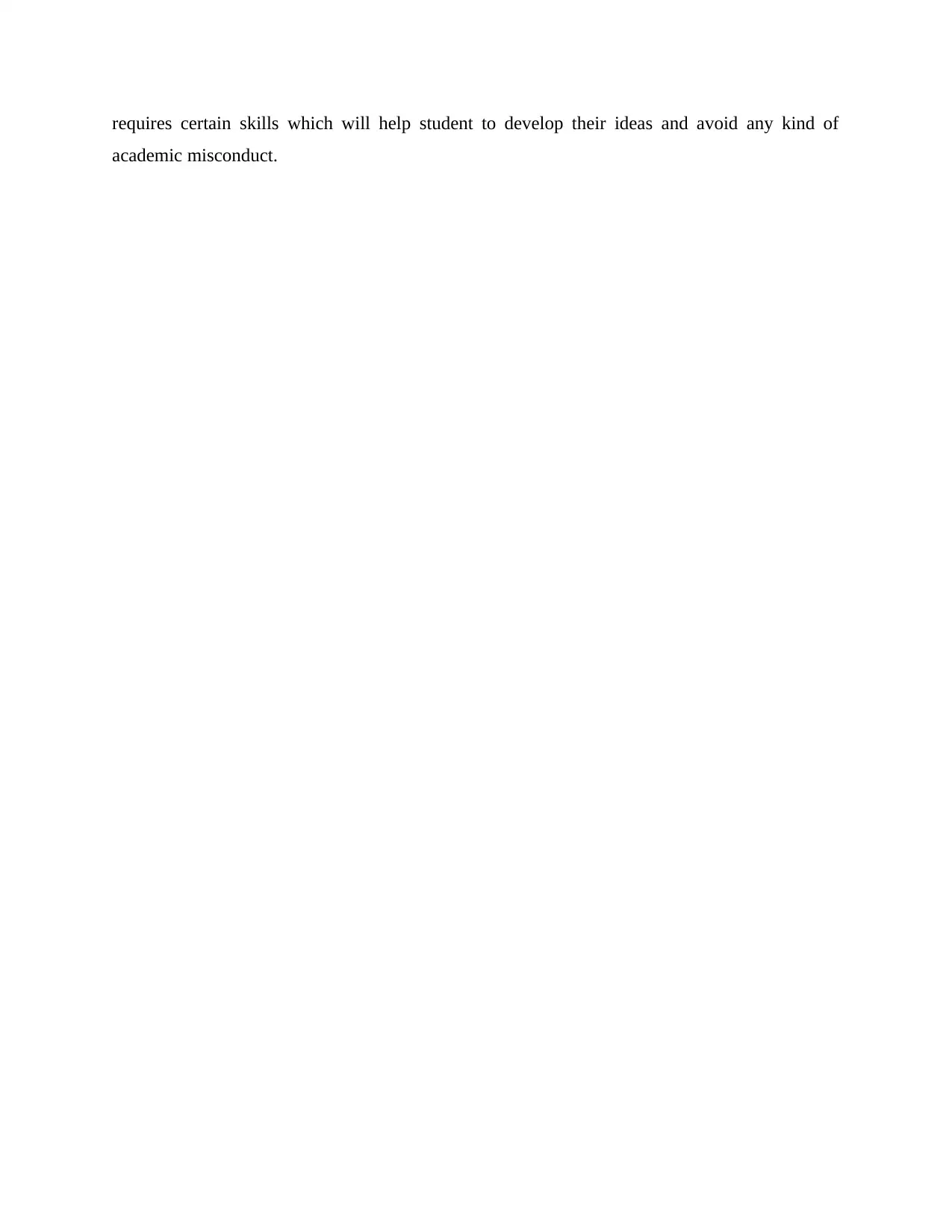
requires certain skills which will help student to develop their ideas and avoid any kind of
academic misconduct.
academic misconduct.
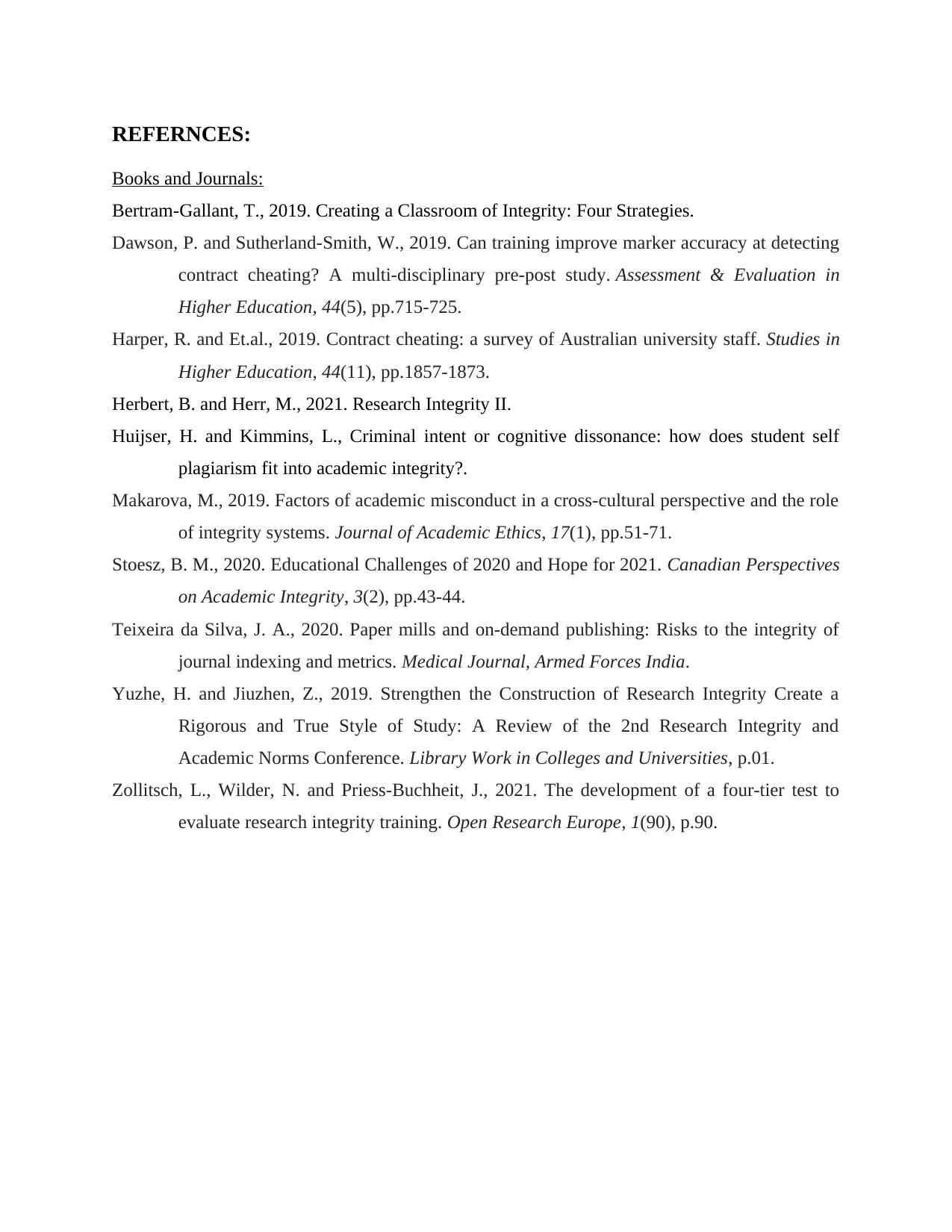
REFERNCES:
Books and Journals:
Bertram-Gallant, T., 2019. Creating a Classroom of Integrity: Four Strategies.
Dawson, P. and Sutherland-Smith, W., 2019. Can training improve marker accuracy at detecting
contract cheating? A multi-disciplinary pre-post study. Assessment & Evaluation in
Higher Education, 44(5), pp.715-725.
Harper, R. and Et.al., 2019. Contract cheating: a survey of Australian university staff. Studies in
Higher Education, 44(11), pp.1857-1873.
Herbert, B. and Herr, M., 2021. Research Integrity II.
Huijser, H. and Kimmins, L., Criminal intent or cognitive dissonance: how does student self
plagiarism fit into academic integrity?.
Makarova, M., 2019. Factors of academic misconduct in a cross-cultural perspective and the role
of integrity systems. Journal of Academic Ethics, 17(1), pp.51-71.
Stoesz, B. M., 2020. Educational Challenges of 2020 and Hope for 2021. Canadian Perspectives
on Academic Integrity, 3(2), pp.43-44.
Teixeira da Silva, J. A., 2020. Paper mills and on-demand publishing: Risks to the integrity of
journal indexing and metrics. Medical Journal, Armed Forces India.
Yuzhe, H. and Jiuzhen, Z., 2019. Strengthen the Construction of Research Integrity Create a
Rigorous and True Style of Study: A Review of the 2nd Research Integrity and
Academic Norms Conference. Library Work in Colleges and Universities, p.01.
Zollitsch, L., Wilder, N. and Priess-Buchheit, J., 2021. The development of a four-tier test to
evaluate research integrity training. Open Research Europe, 1(90), p.90.
Books and Journals:
Bertram-Gallant, T., 2019. Creating a Classroom of Integrity: Four Strategies.
Dawson, P. and Sutherland-Smith, W., 2019. Can training improve marker accuracy at detecting
contract cheating? A multi-disciplinary pre-post study. Assessment & Evaluation in
Higher Education, 44(5), pp.715-725.
Harper, R. and Et.al., 2019. Contract cheating: a survey of Australian university staff. Studies in
Higher Education, 44(11), pp.1857-1873.
Herbert, B. and Herr, M., 2021. Research Integrity II.
Huijser, H. and Kimmins, L., Criminal intent or cognitive dissonance: how does student self
plagiarism fit into academic integrity?.
Makarova, M., 2019. Factors of academic misconduct in a cross-cultural perspective and the role
of integrity systems. Journal of Academic Ethics, 17(1), pp.51-71.
Stoesz, B. M., 2020. Educational Challenges of 2020 and Hope for 2021. Canadian Perspectives
on Academic Integrity, 3(2), pp.43-44.
Teixeira da Silva, J. A., 2020. Paper mills and on-demand publishing: Risks to the integrity of
journal indexing and metrics. Medical Journal, Armed Forces India.
Yuzhe, H. and Jiuzhen, Z., 2019. Strengthen the Construction of Research Integrity Create a
Rigorous and True Style of Study: A Review of the 2nd Research Integrity and
Academic Norms Conference. Library Work in Colleges and Universities, p.01.
Zollitsch, L., Wilder, N. and Priess-Buchheit, J., 2021. The development of a four-tier test to
evaluate research integrity training. Open Research Europe, 1(90), p.90.
⊘ This is a preview!⊘
Do you want full access?
Subscribe today to unlock all pages.

Trusted by 1+ million students worldwide
1 out of 9
Related Documents
Your All-in-One AI-Powered Toolkit for Academic Success.
+13062052269
info@desklib.com
Available 24*7 on WhatsApp / Email
![[object Object]](/_next/static/media/star-bottom.7253800d.svg)
Unlock your academic potential
Copyright © 2020–2026 A2Z Services. All Rights Reserved. Developed and managed by ZUCOL.




